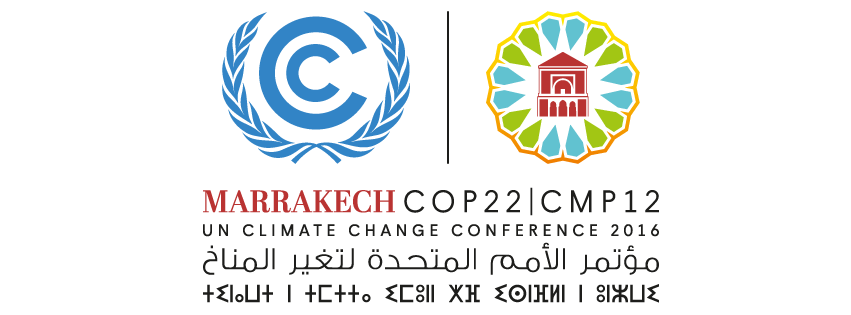
Volgende week begint in Marrakesh de jaarlijkse hoogmis van het klimaatalarmisme: COP 22. Ondanks de euforie van de overeenkomst van de klimaattop in Parijs (COP 21, december 2015), is de stemming gedrukt. Onheilsprofeten mogen weer breed uitpakken in de media.
Onder de titel, ‘Climate Headed for Catastrophic Change Despite Paris Accord’, schreef Jessica Shankleman voor Bloomberg:
This week’s early entry into force of the Paris Agreement on climate change won’t save the planet from rising seas, superstorms and deadly drought, according to the United Nations.
[Noot HL: Zoals ik al vaak heb geschreven, is dit in strijd met de bevindingen van het VN-klimaatpanel (IPCC) dat in zijn SREX-rapport geen verband heeft kunnen ontdekken tussen de geringe opwarming van de atmosfeer die in het verleden heeft plaatsgevonden en weersextremen.]
Without further pledges to curb emissions, temperatures are set to rise by as much as 3.4 degrees Celsius (6.1 degrees Fahrenheit) compared to pre-industrial levels, according to a report by the UN Environment Program on Thursday. The findings risk making December’s Paris Agreement outdated even before it takes effect on Friday, two years earlier than envisioned.
“We will grieve over the avoidable human tragedy,” said the head of UNEP, Erik Solheim, in a statement. “The growing numbers of climate refugees hit by hunger, poverty, illness and conflict will be a constant reminder of our failure to deliver.”
Lees verder hier.
Vormen deze van onheil bezwangerde uitspraken een aansporing om het klimaatbeleid een tandje hoger te zetten? Het ziet er niet naar uit.
Gisteren berichtte ik reeds over de groeiende weerstand tegen het klimaatbeleid in het Verenigd Koninkrijk, dat zich traditioneel altijd als een voortrekker heeft geprofileerd op dit terrein. Zie hier.
Hetzelfde geldt voor een andere voortrekker: Duitsland.
Onder de titel, ‘Shock … Germany To Come To Marrakesh Conference Empty-Handed! Withdraws Climate Protection Plan!’ rapporteerde de Duitse – maar Engelstalige – website ‘NoTricksZone’van Pierre Gosselin onlangs daarover:
The online daily Abendblatt here and media all over Germany report that the country will not pass its climate protection act, which was supposed to be voted on tomorrow, thus meaning the Germany will come to the Marrakesh world climate conference later this month without any plan for decarbonizing its society.
Last June German Environment Minister Barbara Hendricks put forth the Climate Protection Plan 2050 with the aim of starting the “climate-friendly transformation of society”. The plan called for reducing CO2 emissions 40% by 2020 (compared to 1990 levels) and 80 – 95% by 2050.
However the plan was quickly and “radically” gutted out by Chancellor Angela Merkel’s Office, Economics Minister/Vice Chancellor Sigmar Gabriel, Transportation Minister Alexander Dolbridt and Agriculture Minister Christian Schmidt. The plan’s rejection sent a loud signal that the country was deeply divided on the issue, and that there were in fact other priorities far outweighing “climate protection”.
Kortom, het gezond verstand keert langzaam terug in de landen die zich de voortrekkers waanden van het internationale klimaatbeleid ter redding van een planeet, die zonder hen ook wel zal overleven.
Lees verder hier.
En hoe zit het met de EU? Onder de titel, ‘Why Europe’s climate action has been put on hold’ schreef Aline Robert voor EurActiv:
Angela Merkel’s absence from the COP 22 is symbolic of a European climate and energy policy beset by indecision and infighting.
The German Chancellor will be conspicuously absent from the COP 22 in Marrakesh this November. François Hollande, Matteo Renzi and Marino Rajoy all plan to attend the UN climate conference.
This absence speaks volumes about Germany’s motivation to pursue its climate pledges from the COP 21 in Paris last year. As promised, Berlin published its 2050 climate action plan in September. But while the text tables reductions to greenhouse gas (GHG) emissions of 80-95%, it says little about how the country intends to tackle its two main problems: coal-fired power stations and transport. ….
This puts the EU’s climate policy in a delicate position, as Germany had previously been one of the bloc’s leaders in this regard. Paris sees itself as a future leader on climate change, but will have to work on its credibility: France is also behind on its 2020 targets, both in terms of emissions and renewables.
The Union may have ratified the Paris Agreement after salvaging a European deal at the last minute on 6 October, but only a small number of member states have done so themselves.
And European climate policy is at a standstill. Little progress has been made since the 2014 Council summit where the broad 2030 emissions reduction objectives were laid down, while the effect of the COP 21 has been to drive up the level of ambition required.
The Commission’s effort sharing proposal concerning the transport and agriculture sectors met with widespread disapproval in the Environment Council in mid-October. 12 countries (Latvia, the Czech Republic, Denmark, Lithuania, Romania, Poland, Malta, Croatia, Bulgaria, Spain, Austria and Belgium) have called on the executive to make the emissions accounting rules under the proposal more flexible, as a way of reducing their overall effort.
Lees verder hier.
Kortom, het is naïef te veronderstellen dat de afspraken die op de klimaattop in Parijs zijn gemaakt, ook werkelijk zullen worden nagekomen. Dat geldt zowel voor de Europese landen als, a fortiori, voor de niet-westerse landen.
Het is als het kleed van Penelope. Men is thans bezig het voorgaande weefwerk weer uit te rafelen. En dat is maar goed ook, want alle klimaatmaatregelen bij elkaar zullen volgens de theoretische klimaatmodellen van het IPCC in 2100 niet meer dan 0,17 graden Celsius temperatuurvermindering opleveren. Dat kan op een thermometer niet worden waargenomen. Dus ‘All pain and no gain.’
Voor mijn eerdere bijdragen over klimaat en aanverwante zaken zie hier, hier, hier, hier en hier.






Input voor COP22; https://www.sott.net/article/332663-Russian-scientist-The-new-Little-Ice-Age-has-started
Nee, volgens het KNMI wordt het juist een paar graden warmer :
http://klimaatgek.nl/wordpress/2016/11/04/volgende-week-wordt-het-koud-en-andere-zekerheden/#more-3570
Ook reactie op Jan Verbakel.
Geen weerberichten Guus, daar hebben we Vruggink voor, klimaat is pas interessant bij minimum 30 jaar periode. Er zijn leuke grafieken van 10.000 jaar klimaat variantie en dan is de laatste 200 jaarperiodenog een relatief koude periode, die gelukkig iets opwarmt voordat de kleine ijstijd weer invalt.
Een paar ‘laat-me-niet-lachen-bekjes’ zijn weggevallen, maar dat begreep je al denk ik.
mooie vergelijking met Penelope; men ontrafelt het klimaatbeleid!
Ik blijf me verbazen over politici en veel journalisten, die nog nooit de moeite genomen hebben zich eens te verdiepen in het verleden. Dit kan erg simpel via het boek van Salomon Kroonenberg “De Menselijke Maat”.
Van NGO begrijp ik het, zolang ze de idiotie in leven houden krijgen ze veel, heel veel subsidies en dat is nu, het klimaat is later.
Eigenlijk zou er een dikke subsidie gegeven moeten worden aan Climategate.
In ieder geval als de subsidiering van “duurzame energie” morgen wordt afgebouwd, kunnen we overmorgen de zorg en het onderwijs in Nederland weer op peil brengen. Ook justitie en veiligheid en niet te vergeten defensie komen dan aan hun trekken.
En daar bovenop krijgen alle burgers nog iets extra terug. Ik ben blij dat zelfs Duitsland de rem erop gaat zetten. Maar zolang wij in Nederland op de betreffende ministeries de verkeerde mensen hebben zitten die graag naar NGO’s luisteren of daar vandaan komen en een VVD minister Kamp hebben die er absoluut niets van snapt en alleen maar herhaald wat men hem influistert, zolang blijven wij deze verkeerde weg volgen.
Wist u dat de Postcodeloterij een van de grotere sponsoren is van alle lariekoek rond het klimaat. Het is altijd hetzelfde, we spelen met de angsten van mensen voor morgen, Wat een wereld!!!!
Nog maar weer eens een uitvinding dan.
Olie maken uit peop.
Dat zijn er in korte tijd al vier :
ethanol maken uit CO2,
olie uit algen,
CO2 afvangen met koraal riffen, ofwel koraal riffen maken met betonstaal, kippengaas en een beetje stroom, met als gevolg meer koraal, meer CO2 afvang en DUS het tegengaan van de ‘verzuring’ van de oceanen, plus woningen /schuilplaatsen voor vis, en wellicht daardoor weer meer vis.
Is het niet prachtig?
En dus nu weer olie uit peop. Als dit zo doorgaat, hebben we straks helemaal geen problemen meer!
En elk idioot plan om nog CO2 ondergronds te willen opslaan kan de
prullenbakafval oven in.Warmista’s, nep wetenschappers en overige klimaat alarmisten , kijkt u even mee hoe échte wetenschappers problemen oplossen?
“Fuel from sewage is the future – and it’s closer than you think”.
“The technology, hydrothermal liquefaction, mimics the geological conditions the Earth uses to create crude oil, using high pressure and temperature to achieve in minutes something that takes Mother Nature millions of years. The resulting material is similar to petroleum pumped out of the ground, with a small amount of water and oxygen mixed in. This biocrude can then be refined using conventional petroleum refining operations.”
http://www.pnnl.gov/news/release.aspx?id=4317
Overigens doen ze daar nog veel meer nuttige dingen.
Spit die site maar eens door.
Overigens ook lezenswaardig: hoewel dit meer over water vervuiling/gevaarlijke gifstoffen gaat. Maar qua proces zijn er overeenkomsten met bovenstaande.
https://en.wikipedia.org/wiki/Supercritical_water_oxidation
Eveneens lezenswaardig:
“Considering the average passenger vehicle produces 4.7 metric tons of carbon dioxide annually, taking nuclear energy out of the picture would be equivalent to putting an additional 120 million vehicles on the road.”
http://www.tri-cityherald.com/news/local/pacific-northwest-national-lab/article108566217.html
Nog even wat links:
“Engineers have created a continuous chemical process that produces useful crude oil minutes after they pour in harvested algae — a verdant green paste with the consistency of pea soup. ”
https://www.sciencedaily.com/releases/2013/12/131218100141.htm
“Masterminded by FrieslandCampina, the country’s largest dairy collective which buys milk from 13,500 of the Netherlands’ 17,000 dairy farmers, the project has established an initial target of getting 1,000 large farms across the country to make power from cow manure within four years. ”
https://www.theguardian.com/sustainable-business/2016/nov/02/netherlands-europe-dairy-industry-agriculture-biogas-cows-manure-poo-power
Het zijn beloften waar ze niet aan gehouden zullen worden.
Maar het klinkt zo groenig en is subsidieerbaar.
Alle problemen zouden allang de wereld uit zijn als je alle “beloftevolle” technologische doorbraken van de laatste twintig jaar bij elkaar zou optellen.
Ben zelf nogal techneutisch en weet uit ervaring dat van zogenaamde nieuwe ontwikkelingen 99,9% niet het beoogde doel halen.